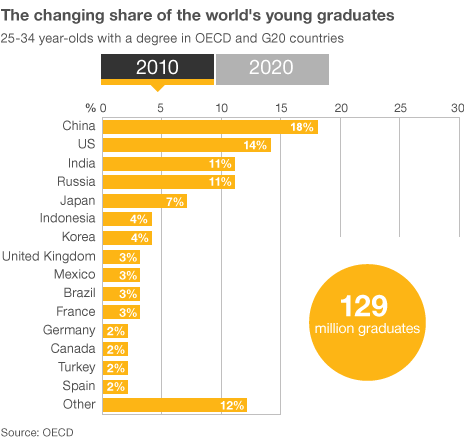What about the
quality of this research output by these emerging countries?
You should not be bedazzled so easily with the presented figures.
It's a good thing developing countries are trying to cope in the scientific world but a critical examination of this development should not be ignored.
Money can’t buy quality research
By: Athar Osama
Published on SciDev.Net on 12 January 2012
Some Muslim countries’ powerful financial incentives to make quick progress in research could backfire, cautions Athar Osama.
Over a decade ago, several governments in the Islamic world woke up from decades of slumber to begin investing heavily in science and innovation. A funding boost helped set up new universities, enhance research grants, and send thousands of students to do PhDs in the developed world.
The regulators and ministries that rolled out these ambitious efforts cautioned against judging their effectiveness and viability too soon, pointing to the limited scientific capacity in these countries. It was popular to say, ‘let’s build a critical mass (quantity) first and worry about raising the standard (quality) later’.
But there was clearly something amiss: some policies seemed either deficient or simply wrong-minded. And evidence of this is beginning to pile up.
Evidence of misguided priorities
The picture emerging is one of a mindless race to secure international publications and increase university rankings using ‘shopping sprees’ for highly cited academics, plagiarism and even outright academic fraud.
A recent article published in Science highlights a practice, prevalent in at least a couple of Saudi Universities, of engaging prolific academics on so-called part-time contracts that pay handsomely in exchange for spending a couple of weeks on campus — and, critically, on condition that the university name is added to their ISI (Institute for Scientific Information) index profiles. The index is one of the factors included in world university rankings.
This results in an artificially higher number of papers published by that university, and hence a higher ranking.
The article notes that this practice is similar to UK universities ‘shopping’ for prolific scientists just before research quality assessments, in order to ensure a higher evaluation and funding for future research.
But there is a fundamental difference: while one may question the timing of UK universities hiring a prolific scientist, it is not a fraudulent practice in and of itself. But claiming credit for a scientist who does not engage in meaningful research with researchers at the university in question, or using work unaffiliated with the university to bump up rankings, is certainly suspect.
Plagiarism and academic fraud
Seemingly sensible policies — such as encouraging academics to publish more — can also backfire if they are badly designed or implemented.
In Pakistan, a strong emphasis by the country’s Higher Education Commission (HEC) on a “publish and get paid” policy has created a culture of plagiarism and academic fraud, according to preliminary evidence that appeared recently in the Pakistani press.
Writing in a reputed English language national daily, Isa Daudpota, a senior administrator at Air University in Islamabad, alleges to have collected evidence of a fraudulent publishing racket that involves “international” and “peer-reviewed” journals, most of which are electronic. [2]
Although many are based in Africa, among other places, in reality they were created and run by Pakistani academics and their ‘friends’ abroad, says Daudpota.
These fraudulent journals may contain suspect or even fictitious names on their editorial boards, or may use names without permission. And participating academics can publish or even review their own work by nominating a non-existent professor as a reviewer.
Analysing the CVs of HEC-approved professors, Daudpota finds preliminary evidence that some professors (mainly having done their PhDs at local universities with relatively lax standards) are more likely to publish in such journals. But so far, the HEC appears to be treating these revelations as isolated cases rather than a systemic problem.
No shortcuts
Muslim countries are not alone in using financial incentives to increase their publishing performance. China and India — two emerging scientific powers — also struggle with similar challenges. [3-5]
Financial incentives also lead to more publications in the industrialised world. But research by Franzoni and colleagues suggests they encourage submissions regardless of quality, while career incentives improve the quality of scientific papers. [6]
In the developing world, where the norms of quality and integrity have yet to take root, policymakers have a responsibility to enforce scientific integrity and ethics.
First, instances of misguided use of financial incentives, plagiarism, and academic fraud must be tackled with zero tolerance and exemplary punishments to individuals and institutions. This would set a precedent and send a message that it does not pay to cheat.
And rather than being treated as isolated instances, such cases should be probed for systemic problems that may tarnish a country’s academic reputation in the long term.
Second, future policies aimed at promoting scientific research must consider unintended consequences. Quality must come first, even if quantity and speed of reforms are compromised, and intrinsic motivators such as the satisfaction of creating new knowledge must be preferred over financial rewards.
Many aspiring governments in the Muslim world are eager to invest in science, and naturally, expect to reap rewards. But they must realise that there is no shortcut to joining the world’s scientific elite.
There are many things money can buy overnight, but the ability to carry out quality scientific research is not one of them.
Athar Osama is a London-based science and innovation policy consultant. He is the founder and CEO of Technomics International Ltd, a UK-based international technology policy consulting firm, and founder of Muslim-Science.com.
Islam Analysis (15): Money can't buy quality research | Muslim-Science.Com






